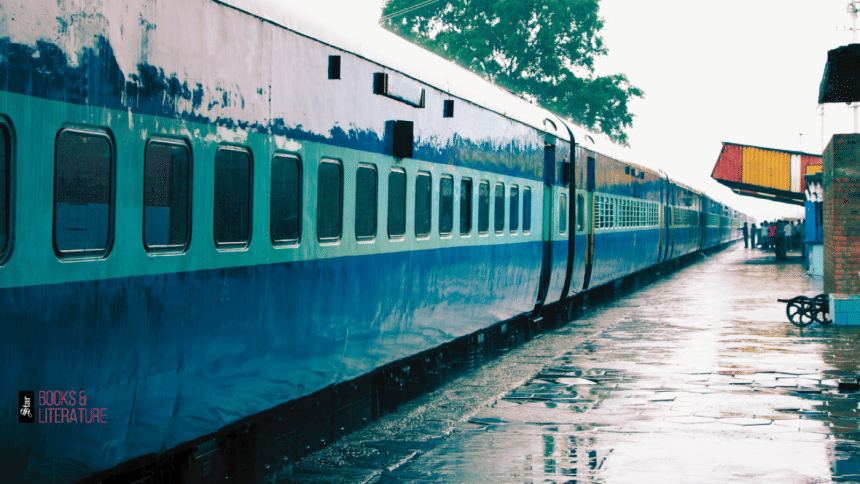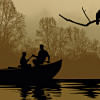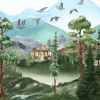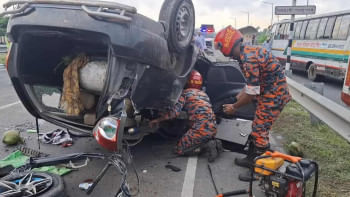Metalheart

The steel of my wheels ring with music as I roar over the tracks. The wind is gentle today, almost tentative, but the rain is not. I feel the drops hammer down into my metal body, pinging like tiny bells. It makes me laugh. I like the rain. It washes me clean. It washes the humans, too, and I love that as well, watching them scatter in panic, rushing pell-mell over each to climb into me. No one notices my one bothersome axle.
I love this time of the year. It's when I feel the most important, the most wanted. The other transports are always popular, but it's always during Eid that the people go slightly mad, desperate to climb into my compartments so I can deliver them home. Or as close as my tracks allow. I love their hands battering against my windows as they run beside me, the giggles of the smaller humans every time I begin to pull out of the stations. I contain multitudes within my metal casings, a hundred times a hundred thousand dreams, and it is an honour every year to carry those little dreams and the little humans to where they so desperately want to go.
"A train! Look, Ammu, a train!"
"Yes, babu. That's the train that's going to take us home for Eid!"
Conversations like that make me so proud. Mothers introducing me to their children, the wonder in the eyes of the little ones. The excitement as I screech to a stop in front of them. Their feet on my floors as they climb aboard, their luggage groaning from the weight of the gifts inside.
"Such a big train!" they sometimes say.
The mothers laugh. If I could, I would laugh, too. Such wondrous things, these humans.
The man who operates me is called Nasiruddin by his coworkers. I know him well. He has been my friend for a long time now; most of my life, in fact. He's currently fast asleep in his chair. I don't blame him. Humans need to sleep every few hours to function, and Nasiruddin has not been doing that because of the Eid rush. It's all right, though. I know the way well. I will keep on my tracks, and take my precious cargo where I must.
They're all over me now. Literally. There're humans clinging to my roofs, hanging like monkeys on my sides, several dozen are even perched on the sides of my engine car. I am terrified one of them might slip and fall in this rain, forcing my wheels to run over their fragile little bodies. It's happened before—far, far too many times for me to count. It rattles me every time. I wish no harm on these creatures. They might be strange and unpredictable and emotional, but all they want is to go home for the holidays. It truly isn't a lot to ask for.
I fly over the tracks, my wheels singing again. I like this stretch of the journey. On either side are green fields, rippling in the wind. Off in the distance, I can see the new bridge spanning the river. The humans have named it something I cannot pronounce, but I know it's a… double bridge? It can carry both cars and me. I know the name of the river, though. It's Padma. Lovely river, very polite. She always greets me with a splash and a wave. I blow my whistle right back at her.
The sound of the whistle makes Nasiruddin jerk awake. I feel his hands scramble frantically over the controls, as if panicking now will make up for the time he spent asleep instead of operating me. I wish I could soothe him, tell him to be calm. One of my axles aches, but all is well.
In one of the compartments, one of the humans—a male, I think—is vibrating with excitement. His brand-new wife is sitting beside him, and he cannot contain his glee. He clutches her hand, ignoring her blushes, and gushes about his home.
Several rows behind the new couple sits a family of six. They are silent. They have no joy. The mother, I think, is crying. Her lips keep forming the words "Abba nai, Abba nai…" Her husband is ignoring her, gazing out of the window. His teeth are clenched in irritation. He's glad his father-in-law died. At least he can get his hands on the inheritance now. The children dare make no sound at all.
In the bathroom, a male human is panicking. His head is stuck inside his panjabi, and he cannot reach the gap with his flailing arms to wrest his clothes into the proper position. He bumps hard against the toilet and mutters curses under his breath. This is a brand-new panjabi—why is it so tight?!
In a different compartment is a female human in a heavy veil, every part of her body carefully concealed. She gazes out of the window. Well, tries to, anyway. She has been nudged out of her window seat and into the aisle by the sheer press of the people. The stink of sweat makes her stomach roil. She doesn't dare complain, though. Once, she flew above me in sleek machines, her voice a command, her scent thick with damask and power. Now she sits cloaked in anonymity, pressed into the aisle, her thoughts loud with outrage. I don't understand her pain, but I hear it. They used to call her "madam" and fawn over her every word. But then some pesky, arrogant kids had staged a protest, the government had fallen, and now she was forced to travel in this peasant-like manner. Forced into disguise. To hide! Outrageous…
No one noticed the lost child on the station, screaming for his mother. No one but I know her mother was screaming for him, too. The crowd was too thick, though. They couldn't find each other. I have hope, though. An old man found the child just before I left the station—he knows the pain of being left behind. He will care for the little one. I know him well, he rode on me many times before his own children deemed him too old to travel anymore. I know well how he feels.
Perched on the roof with astonishing ease, another human carefully counts the money in his pocket. Fifteen fresh banknotes. Brand new. They even glitter in the light! Eid is going to be incredible this year. He quickly returns them to his pocket, worried about getting the money wet in the rain. Absurdly, he does not notice the man sitting a few feet away from him, eyeing the pocket the wallet has just vanished into. That greedy gaze sours the air more than any sweat ever could.
I blow my whistle loudly, hoping to warn him. It does not work.
So I continue my journey, my wheels singing as I blaze over the tracks. So many humans, so many dreams, and I am the one who bears them all. They hailed me, screaming in excitement, as I entered the station, and now they cling to me with all the desperation of hard-earned respite. They do not know how much I love them. It is sad sometimes, yes, but I do not mind too much.
I know my engine is dying. I know that, by the time the next Eid rolls around, the busy little humans will have taken me apart to create something new. I do not blame them.
I failed in my duty last year. I hit another of my kind, and the red that ran on the tracks because of me haunts me still. It haunts Nasiruddin, too. No one seemed to realise that the damage to my flank from last year's unrest hurt one of my axles. That was why I lost control.
But it's okay. Their feelings are understandable. So I do not blame them for wanting me to stop. It is only fair, after all. Some other heart of steam and steel will bear the humans home next year. Their children will clap for the new one. Their hands will cling to someone else. I have a strange, hollow ache somewhere deep inside me. But it's okay. I know my duty.
I will bear these ones home one last time. One last Eid. I hope someone will take care of Nasiruddin.
Sarazeen Saif Ahana is an adjunct member of the faculty at Independent University, Bangladesh, where she teaches English and waves at every airplane and train that pass her by.

 For all latest news, follow The Daily Star's Google News channel.
For all latest news, follow The Daily Star's Google News channel. 










Comments